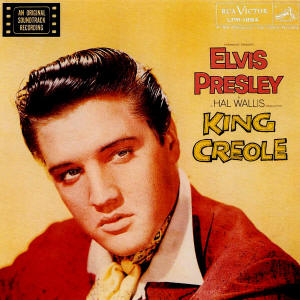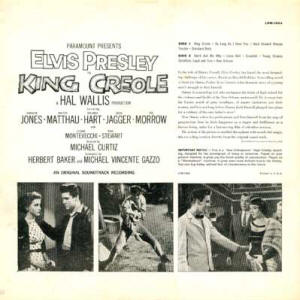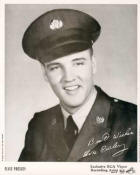Verdict
The songs are strong, Elvis' performances are great and the jazzy brass sounds add a new element to his music. "King Creole" is not just the king's best soundtrack album, but one of his best albums in general.
![]()
(C) RCA Victor
The ultimate site about the king of the analogue age


In July 1958 RCA Victor had released the soundtrack of Elvis' fourth motion picture on the extended players "King Creole - Volume 1" and "King Creole - Volume 2" as well as on the single "Hard Headed Woman" / "Don't Ask Me Why". After a while the management of the record company and Colonel Parker came to the conclusion, that there was enough room for another longplayer and so a soundtrack album was issued in September. With 250,000 units retailed during the initial sales period Billboard started to list "King Creole" on their "Pop Albums Chart" on September 15, 1958. The record stayed for 15 weeks and peaked at number 2. Twentynine years later the RIAA honored the domestic sales with a Gold Award. In total "King Creole" sold 2.75 million copies, which translates to 412.5 million paid streams of the complete album or 4.13 billion paid streams of individual tracks. Therefore the soundtrack became the worst selling Presley lp to date, but of course everyone knew, that this was the second exploitation of the material. Combined the two extended players, the single and the longplayer had sold 5.8 million units.
In 2016 the complete Presley catalogue was restored and remastered by Vic Anesini for a boxed set of 60 compact discs called "The Album Collection". Sony Music Entertainment provides the streaming platforms with the same versions of the individual albums (some of them offering bonus tracks), albeit in 24 bit/90 khz flac. That means, if the platform of your choice supports high resolution audio, you can enjoy the tracks in the same quality Sony used to scan and master them. On Spotify, which has a market share of approximately 30% and is the only platform that publishes streaming figures, "King Creole" accumulates 96 million streams with >30,000 requests per day.
The cover design of the album was based on the sleeve of the ep "King Creole - Volume 1", but this time to photo was printed correctly. The backside featured photos from the movie. As an incentive to buy the first editon also included a special photo card.

The soundtrack was recorded on January 15th, 16th and 23rd 1958 at Radio Recorders in Hollywood/California. The sessions were produced by Walter Scharf and Phil Khagan and engineered by Thorne Nogar. The band consisted of Elvis himself (guitar) as well as Scotty Moore (guitar), Hilmer J. Timbrell (guitar), Bill Black (bass), Ray Siegel (bass and tuba), Neal Matthews (bass and guitar), D.J. Fontana (drums), Bernie Mattinson (percussion), Gordon Stoker (bongos), Hoyt Hawkins (zimbel), Dudley Brooks (piano), Mahlon Clark (clarinet), John Ed Buckner (trumpet), Justin Gordon (saxophone), Elmer Schneider (trombone) and Warren Smith (trombone). The harmony vocals were provided by The Jordanaires (Gordon Stoker, Neal Matthews, Hoyt Hawkins and Hugh Jarrett) and Kitty White (on "Crawfish"). On February 11, 1958 an additional session was held at the Paramount Soundstage in Hollywood/California. It was also produced by Walter Scharf and Phil Khagan, but engineered by Phil Wisdom. Elvis and Scotty Moore played guitar, Bill Black was on bass, D.J. Fontana on drums and Dudley Brooks on piano. Once again the harmony vocals were provided by The Jordanaires. The session had been scheduled to record "Danny" and "Steadfast, Loyal And True" as well as harmony vocals for "Lover Doll".
In 2015 Follow That Dream Records released a collector's edition of "King Creole", which included outtakes, live session mixes and demos. For a review tap HERE.
King Creole
The title song of the movie was written by Jerry Leiber and Mike Stoller. To fit the location of the movie it was enhanced with brass, which sets it apart from other tunes of this kind. On January 15, 1958 Elvis recorded 18 takes of "King Creole", but because he didn't like the results he recorded 13 more on January 23rd. The final one became the master. It was first released on "King Creole - Volume 1" (1958) and later once again on the boxed set "The Other Sides - Worldwide Gold Award Hits Volume 2" (1971).
As Long As I Have YouThis ballad was also known from the extended player "King Creole - Volume 1" (1958). "As Long As I Have You" was written by Fred Wise and Ben Weisman, who would become a main source for movie tunes in the following decade. In contrast to many of their later compositions, this one has quality and is performed very well by Elvis. It was done within ten takes on January 16, 1958.
Hard Headed WomanThe singer tries to prove his theory, that hard headed women are the root of all evil with several episodes from the Bible. The lyrics are funny, the melody and rhythm are straight rock'n'roll. The brass-element adds something unique to the song. Elvis performs it with a lot of power, almost aggression. It's a very good track and certainly one of the king's best movie tunes. It was written by Claude DeMetrius and recorded by Elvis on January 15, 1958. The king needed ten takes to archive a satisfactory master. RCA Victor released "Hard Headed Woman" on a single (1958), on the extended player "A Touch Of Gold - Volume 1" (1959) and on the boxed set "Worldwide 50 Gold Award Hits - Volume 1" (1970).
TroubleHere we have another highlight. Elvis sounds angry and dangerous and delivers the best version possible of Jerry Leiber's and Mike Stoller's "Trouble". In 1968 the king opened his tv special "SINGER presents Elvis" with this song and also performed it during the "Elvis Summer Festival 1973" at the Las Vegas Hilton. But he never surpassed his original studio recording, taped on January 15, 1958 within 5 takes. "Trouble" first appeared on the ep "King Creole - Volume 2" (1958), later it was re-issued on the boxed set "The Other Sides - Worldwide Gold Award Hits Volume 2" (1971). The alternate version can be found on the album "Elvis" (1968).
Dixiland RockThis track was also known from the ep "King Creole - Volume 2" (1958) and would later be re-released on the boxed set "The Other Sides - Worldwide Gold Award Hits Volume 2" (1971). As the title suggests, it's a rock'n'roll song with elements of dixiland music. It was supposingly written by Aaron Schroeder and Rachel Frank, but Claude DeMetrius and Fred Wise are also mentioned at times. Elvis taped "Dixiland Rock" on January 16, 1958 and needed 14 takes to do so.
Don't Ask Me WhyRCA Victor first released this ballad on the b-side of "Hard Headed Woman" (1958), later it also appeard on the ep "A Touch Of Gold - Volume 3" (1960) and the boxed set "The Other Sides - Worldwide Gold Award Hits Volume 2" (1971). It was recorded on January 16, 1958 within 12 takes. "Don't Ask Me Why" was written by Fred Wise and Ben Weisman.
Lover DollSid Wayne and Abner Silver wrote this nice popsong, which was taped by Elvis on January 16, 1958. Take number 7 had already been released on the extended player "King Creole - Volume 1" (1958), but the version on the longplayer included harmony vocals by The Jordanaires. They had been recorded in a separate session on July 19, 1958. The boxed set "The Other Sides - Worldwide Gold Award Hits Volume 2" (1971) also included the overdubbed version of "Lover Doll".
CrawfishElvis recorded "Crawfish" on January 15, 1958 and needed 7 takes to produce a satisfactory result. The female voice belongs to the singer Kitty White. Before its release the recording was shortened of a minute. Besides that the voice of Mrs. White was enhanced with an echo effect and put a little in the background. In the movie the female voice belongs to a lady, who promotes the crawfish she is selling with the song. Superficially the lyrics are about the catching and cooking of the animal, but of course the crawfish is a metaphor for the primary male sexual characteristic. Fred Wise and Ben Weisman wrote this (for the 50s of the previous century) bold song, which was known from the extended player "King Creole - Volume 2" (1958). Later RCA Victor would also release "Crawfish" on the boxed set "The Other Sides - Worldwide Gold Award Hits Volume 2" (1971).
Young DreamsThe popsong with a touch of blues was written by Martin Kalmanoff and Aaron Schroeder. The king recorded it on January 23, 1958 and selected the 8th take for release. This happened in 1958 on the extended player "King Creole - Volume 2" and in 1971 on the boxed set "The Other Sides - Worldwide Gold Award Hits Volume 2".
Steadfast, Loyal And TrueThis ballad is the only new song on the album. Even though it sounds like a traditional, it was written especially for the movie by Jerry Leiber and Mike Stoller. In contrast to the writers I like "Steadfast, Loyal And True" very much. Elvis performs it with much emotion and it completely sounds unlike all the other tracks on this longplayer. The song was recorded on February 11, 1958 at the Paramound Sound Stage, the harmony vocals were overdubbed on June 19th.
New OrleansElvis performs this bluesy song very well. On January 15, 1958 he needed five attempts to do so. "New Orleans" was written by Sid Tepper and Roy C. Bennett, who also would provide many of the average movie tunes of the 1960s. The fans already knew the track from the extended player "King Creole - Volume 2" (1958). Later it also would be released (surprise! surprise!) on the boxed set "The Other Sides - Worldwide Gold Award Hits Volume 2" (1971).
The songs are strong, Elvis' performances are great and the jazzy brass sounds add a new element to his music. "King Creole" is not just the king's best soundtrack album, but one of his best albums in general.
![]()
(C) RCA Victor